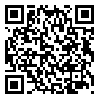Volume 2, Issue 2 (Autumn and Winter 2021)
پژوهش های مابعدالطبیعی 2021, 2(2): 185-209 |
Back to browse issues page
Download citation:
BibTeX | RIS | EndNote | Medlars | ProCite | Reference Manager | RefWorks
Send citation to:



BibTeX | RIS | EndNote | Medlars | ProCite | Reference Manager | RefWorks
Send citation to:
ghasemi A. Analysis of Al-Ghazali's Philosophers and Study of Ibn Rushd's Defense. پژوهش های مابعدالطبیعی 2021; 2 (2) : 8
URL: http://mi.khu.ac.ir/article-1-127-en.html
URL: http://mi.khu.ac.ir/article-1-127-en.html
Institute for Humanities and Cultural Studies , azam_ghasemi@yahoo.com
Abstract: (1704 Views)
Philosophical understanding of the concept of God, and theological understanding of the concept of God from the beginning has faced challenges and conflicts that may be the culmination of this conflict in the Tahafat of Ghazali Philosophers who excommunicated philosophers for believing in three issues. The purpose of this research is to re-read Ghazali's critiques of philosophers and to test his point of view, then to examine the strengths and weaknesses of Ibn Rushd's defense. Al-Ghazali has rightly realized that proving the existence of God is a difficult path by proving the step of the universe, however, believing in the temporal existence of the universe also has false consequences that are no less than the consequences of the teachings of philosophers. Regarding the knowledge of God in detail, Ibn Rushd's answer seems appropriate and can solve Ghazali's objection in this regard. Al-Ghazali differs from Ibn Rushd in that he cites the Qur'an to prove the knowledge of God in all its details, but the philosopher comments on something about which he cannot have a correct and accurate understanding. Regarding the physical resurrection, Ibn Rushd harmonizes the interpretation between philosophical truth and religious teaching, but with the disagreement of Ibn Rushd and Ghazali about the interpretation in the final judgment.
Article number: 8
Type of Study: Original Article |
Subject:
Philosophy
Send email to the article author
| Rights and permissions | |
 |
This work is licensed under a Creative Commons Attribution-NonCommercial 4.0 International License. |









